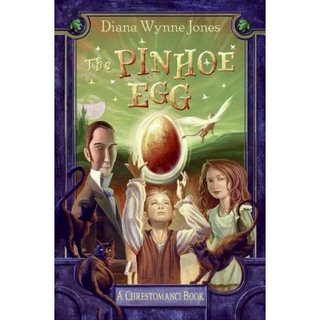Hilary McKay's Caddy Ever After
Diana Wynne Jones's The Pinhoe Egg
Lemony Snicket's final Unfortunate Events book, THE END.
I was delirious to see The Pinhoe Egg in the bookstore when I went in search of the McKay book. Somehow, I missed the news that a new DWJ book was coming out - it was a total surprise. Though I rarely buy new or hardback books, I snapped this one up in an instant. I felt SO decadent bringing the Jones and Mckay books to the register, along with three other first-in-series that I was buying for a friend's birthday (The first Bartimaeus, the first Stravaganza and the first Charlie Bone).
The Pinhoe Egg is another Chrestomanci book,
 but this one picks up where Charmed Life ended (well, roughly a year later). Cat is, once again, a primary character, along with Marianne Pinhoe, a girl from a neighboring village with enchantress-level magical gifts, and a very odd, secretive and nasty family, all of whom work with "the craft."
but this one picks up where Charmed Life ended (well, roughly a year later). Cat is, once again, a primary character, along with Marianne Pinhoe, a girl from a neighboring village with enchantress-level magical gifts, and a very odd, secretive and nasty family, all of whom work with "the craft."I think I will need several re-reads before I love this book; it's got some wonderful moments, and Cat is an outstanding character (and really true to his original character in Charmed Life). I've come to love Conrad's Fate, though the first time or two through I was skeptical. So though right now I am not especially raving about The Pinhoe Egg, I feel fairly sure I will come to like it more. And ANYthing by Diana Wynne Jones is about 10 times better than most every other book.
I found myself recognizing bits of magic from other DWJ books - there's a griffin (Dark Lord of Derkholm and Year of the Griffin - I'd love another book about those characters, incidentally); there are "hidden folk" of the land, and a number of earth or land-magics (dwimmer seems to be the term here), as well as some ancient magical history that reminded me VERY strongly of The Merlin Conspiracy. It doesn't feel at all like Jones is ripping herself off, or even recycling in a lazy or sloppy way; let's face it, griffins are pretty compelling characters to work with. I still can't clearly picture griffins in my imagination, but that's no fault of Jones's; I just cannot SEE a talking "human" bird/lion mix. It's the beak, I think, that perplexes me.
One slight quibble with Jones's books: her main characters always turn out to have insanely enormous amounts of magical talent. enchanter standard, all around. I do wonder what it would be like to have a main character who had only moderate quantities of magic.
There are some deliriously good touches in The Pinhoe Egg - Nutcase the cat (Jones does animals like no one I've ever read), the transformation of Woods House (those blue and green and white tiles....), the househobs, Jane James, and Irene - are all marvellous. Jason Yeldham, the herbalist, is also a great character, and makes me wonder if perhaps another book about Jason will appear - his travels around the Related Worlds gathering plants would make an AWESOME magical travelogue.
And Gammer's madness is hysterical. "Utterly dolphined" may be my new favorite sentence in any book.
As with any Diana Wynne Jones book: HIGHLY, HIGHLY RECOMMENDED!!!





